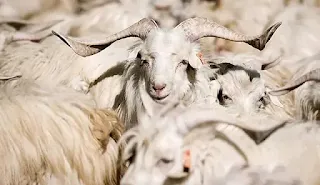Chinese scientists have cloned two live Tibetan goats from the body cells of an adult goat in northwestern China's Qinghai Province, in an attempt to preserve this breed of livestock.
Under the programme, led by a research team from Northwest A&F University, three male goats and one goat were used as cloned cell donors.
Little information has been published about this development.
Su Jianmin, the chief scientist leading the cloning program, announced the successful birth of two cloned goats, with the first baby weighing 3.4 kg. He is in good health. Adding that the cloning research conducted in Qinghai could help the breed maintain its ability to adapt to the difficult climatic conditions on the plateau.
Ma Yuehui, a researcher at the Institute of Animal Science of the Chinese Academy of Agricultural Sciences, told Xinhua that cloning in the plateau environment is a major achievement in the field of Tibetan goat breeding technology, and is of great significance for improving the quality and efficiency of the Tibetan goat breeding industry.
Tibetan goats are an important livestock on the Qinghai-Xizang Plateau. Therefore, maintaining its genetic diversity and adaptability is crucial to the viability of the agricultural region.
Su's team has been working with the Animal Disease Prevention and Control Center of Xining Municipality since 2018 to conduct embryo engineering application technology research on Tibetan yaks and goats.
Zhang Qingtu, a researcher from the center, said the research program will help promote good varieties of Tibetan goats and boost the income of farmers and herders.
It is noteworthy that scientists from the Chinese Academy of Sciences previously announced their success in cloning the first rhesus macaque monkey, and that the cloned monkey exceeded expectations in its growth for more than two years.
The cloned monkey was born on July 16, 2020. It is worth noting that this achievement represents the longest survival period recorded for any cloned rhesus macaque so far.
This achievement is of great importance to the advancement of medical research, as rhesus macaques are commonly used as animal models in scientific studies due to their physiological similarity to humans.
Cloning generally allows the preservation of desirable genetic traits in livestock, wildlife, and endangered species. This helps maintain biodiversity and prevents the loss of valuable genetic material.




